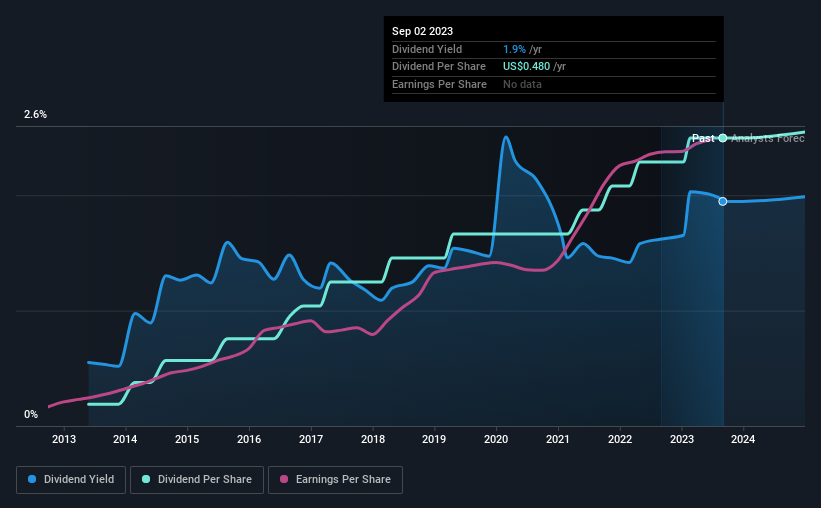Unity Bancorp, Inc. (NASDAQ:UNTY) Looks Interesting, And It's About To Pay A Dividend
It looks like Unity Bancorp, Inc. (NASDAQ:UNTY) is about to go ex-dividend in the next four days. The ex-dividend date is usually set to be one business day before the record date which is the cut-off date on which you must be present on the company's books as a shareholder in order to receive the dividend. The ex-dividend date is important because any transaction on a stock needs to have been settled before the record date in order to be eligible for a dividend. Accordingly, Unity Bancorp investors that purchase the stock on or after the 7th of September will not receive the dividend, which will be paid on the 22nd of September.
The company's next dividend payment will be US$0.12 per share. Last year, in total, the company distributed US$0.48 to shareholders. Last year's total dividend payments show that Unity Bancorp has a trailing yield of 1.9% on the current share price of $24.66. Dividends are a major contributor to investment returns for long term holders, but only if the dividend continues to be paid. So we need to investigate whether Unity Bancorp can afford its dividend, and if the dividend could grow.
Check out our latest analysis for Unity Bancorp
Dividends are usually paid out of company profits, so if a company pays out more than it earned then its dividend is usually at greater risk of being cut. Unity Bancorp has a low and conservative payout ratio of just 12% of its income after tax.
When a company paid out less in dividends than it earned in profit, this generally suggests its dividend is affordable. The lower the % of its profit that it pays out, the greater the margin of safety for the dividend if the business enters a downturn.
Click here to see the company's payout ratio, plus analyst estimates of its future dividends.
Have Earnings And Dividends Been Growing?
Stocks in companies that generate sustainable earnings growth often make the best dividend prospects, as it is easier to lift the dividend when earnings are rising. If earnings fall far enough, the company could be forced to cut its dividend. That's why it's comforting to see Unity Bancorp's earnings have been skyrocketing, up 26% per annum for the past five years.
The main way most investors will assess a company's dividend prospects is by checking the historical rate of dividend growth. In the past 10 years, Unity Bancorp has increased its dividend at approximately 29% a year on average. It's exciting to see that both earnings and dividends per share have grown rapidly over the past few years.
To Sum It Up
Is Unity Bancorp worth buying for its dividend? Companies like Unity Bancorp that are growing rapidly and paying out a low fraction of earnings, are usually reinvesting heavily in their business. This is one of the most attractive investment combinations under this analysis, as it can create substantial value for investors over the long run. In summary, Unity Bancorp appears to have some promise as a dividend stock, and we'd suggest taking a closer look at it.
On that note, you'll want to research what risks Unity Bancorp is facing. In terms of investment risks, we've identified 1 warning sign with Unity Bancorp and understanding them should be part of your investment process.
Generally, we wouldn't recommend just buying the first dividend stock you see. Here's a curated list of interesting stocks that are strong dividend payers.
Have feedback on this article? Concerned about the content? Get in touch with us directly. Alternatively, email editorial-team (at) simplywallst.com.
This article by Simply Wall St is general in nature. We provide commentary based on historical data and analyst forecasts only using an unbiased methodology and our articles are not intended to be financial advice. It does not constitute a recommendation to buy or sell any stock, and does not take account of your objectives, or your financial situation. We aim to bring you long-term focused analysis driven by fundamental data. Note that our analysis may not factor in the latest price-sensitive company announcements or qualitative material. Simply Wall St has no position in any stocks mentioned.



